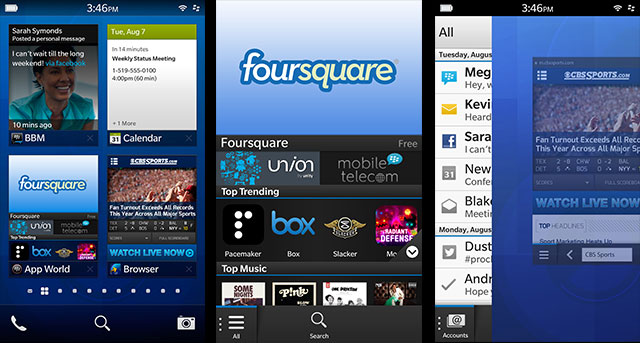Research in Motion (RIM) is pulling out all the stops in an effort to save its embattled BlackBerry platform. This week, the Canadian company took the wraps off its long-overdue BlackBerry 10 operating system. Though the final version will only be available commercially in the first quarter of next year, the company is keen — some would say desperate — to get the attention of developers.
It even went as far as getting three of its vice-presidents — Alec Saunders, Chris Smith, and Martyn Mallic — to lip sync to a reworked version of power ballad Keep on Loving You by US rock band REO Speedwagon to convey the message that the company continues to hold developers in high regard and realises how important they are if BlackBerry 10 is to succeed.
RIM SA MD Alexandra Zagury says that when BlackBerry 10 is launched, there will be more than 100 000 BlackBerry applications, many of which will work on the new operating system. She says SA has 190 developers writing BlackBerry apps.
BlackBerry 10 will run only on devices with multi-core processors because of the demands of the streamlined interface and the approach to multitasking. The company has worked hard to overhaul the user interface and make the user experience intuitive and effortless.
New features include the ability to swipe up and right on the screen in any application — or from a home screen or settings menu — to pull up a consolidated inbox of e-mail, text, BlackBerry messages and social feeds. RIM calls the new feature “peek”.
TechCentral had the chance to handle a device running the latest development version of BlackBerry 10 and found it to be a vast improvement over its predecessors. Gone are the convoluted menus and enormous lists of application icons in favour of gestures and swipes reminiscent of those introduced on the ill-fated BlackBerry Playbook tablet.
Aside from the “peek” feature, a key aspect of BlackBerry 10 is the two home screens, each of which shows four applications running simultaneously. Rather than apps becoming static, they each display pertinent information like the next upcoming event in the case of the calendar app.
Moving between apps and home screens is effortless and the interface is smooth and elegant.
RIM has also paid a great deal of attention to text input. Predictive text makes word recommendations, with a slight upwards swipe inserting the word it suggests. Swiping down on the keyboard toggles between character, number and symbol keyboards.

BlackBerry 10 will also scan users’ inboxes and social media feeds and learn about people’s vocabulary habits so that it can alter predictive text according to the app being used. For example, when typing an e-mail, users will be prompted with formal wording while they’re likely to see less formal suggestions for social media apps.
There’s also support for multilingual typing without having to change keyboards or settings and the device picks up users’ typing habits to try and improve accuracy.
The Internet browser has full HTML5 support, touch-based BlackBerry 10 devices will support 1080p high-definition video, DNLA media sharing is built in, and, with BlackBerry Balance, users can have separate personal and business profiles that can tie into individual BlackBerry Internet Service and BlackBerry Enterprise Service profiles allowing for work and personal information and applications to be kept separate.
Playing to its heritage as an enterprise-focused company, RIM says BlackBerry Balance also allows company IT departments to manage enterprise functionality and provide or remove services. Enterprise-only applications can’t be moved between profiles and neither can sensitive documents or e-mails. This should also make it easier for BlackBerry users to keep their personal settings, even when changing companies.
The market took kindly to RIM’s announcements, with the company’s share price enjoying a rare rise of 5,5% on Wednesday. However, the share price has fallen in value by two-thirds in the past 12 months.
With BlackBerry 10 still at least three to six months away, the question is whether BlackBerry users due for handset upgrades before then will wait, and whether the new software — which still feels in many ways like an attempt simply to catch-up with Google’s Android and Apple’s iOS — will be enough to win the company new users while also wooing back those who have defected. — (c) 2012 NewsCentral Media

